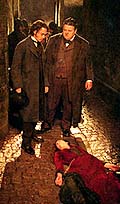From Hell
 for strong violence/gore, sexuality, language and drug content.
for strong violence/gore, sexuality, language and drug content.
Reviewed by: Carole McDonnell
CONTRIBUTOR
| Moral Rating: | Very Offensive |
| Moviemaking Quality: |
|
| Primary Audience: | Adult |
| Genre: | Thriller, Horror |
| Length: | 2 hr. 17 min. |
| Year of Release: | 2001 |
| USA Release: |

| Featuring |
|---|
|
Johnny Depp Heather Graham Ian Holm Robbie Coltrane Jason Flemyng |
| Director |
|
Albert Hughes Allen Hughes |
| Producer |
|
Don Murphy Jane Hamsher Kevin Messick |
| Distributor |
Like many conspiracy theories, “From Hell”, re-works history and uses art to make a political statement. When it comes to conspiracy theories, there are a few things we all know. For instance, we know that most of the evils in the world are caused by wealth, prejudice, and power. We “think” that the wealthy always conspire through law or through secret societies to keep power in their hands and if that power goes, then the poor folks of the world will suffer for it. We know, too, that in Victorian England, the world’s first modern serial killer, Jack the Ripper, created fear among London’s “unfortunate women” (prostitutes) through some very ghastly killings and dis-embowelings. What we didn’t know, of course is that Jack the Ripper’s crimes might have been the secret conspiratorial work of some powerful agency.
The heroes of this movie are “working girls,” prostitutes who are used by the repressed hypocritical upper class. The main hero, Inspector Abberline (Johnny Depp), is an opium-addicted detective who takes laudanum (related to heroin) to create visions of murders happening across London. He also might be taking laudanum and absinthe to numb himself to the pain he feels about the death in pregnancy of his wife. When we first meet our hero, he is “wasted” in an opium den and visions of Jack’s future crime are appearing to him. We might even be able somehow identify with Mary Kelly (Heather Graham), the main heroine and the prostitute Inspector Abberline falls in love with. Besides, unlike all her murdered friends, she is never really seen actually “working.” And, in a scene reminiscent of “Pretty Woman”, we get to view the prostitute’s highest wish: a rich and good man who will marry her and take her away from poverty.
The film speaks against prejudice. We see that Victorian England was like many modern countries. The poor and the non-WASP are the spiritual shadows of the rich. Those who happen to be rich because of an accident of birth believe themselves to be more moral than the minority or the disenfranchised. Crimes are generally supposed to be done by the poor or by minorities. In Victorian London, no one truly cares about murder victims in the poorer communities. No one wants to believe that a gentleman might be responsible for any of these crimes. Some can’t even conceive that an Englishman may be the culprit. They believe that Jack is probably Jewish, Catholic, a wild escaped “Red Indian,” a butcher or some combination thereof. The problem, however, is that Jack’s murders are surgically precise. Education and Enlightenment is the cause of it. Inspector Abberline can only assume that we are dealing with surgeons—an upperclass person—unless Jack is a truly educated middle-class butcher. That is when his problem begins. And no rich powerful person can be trusted because power has already corrupted him. And we all know how protected the insider can be.
But for all its good intentions, the story did not hold me. The love story is weak. The lovers have few scenes together. The story is slow and there are gaping holes in the plot. For instance, why doesn’t he tell the girls that the killer snares his victims with grapes? And if he sees the future victims in his visions, why doesn’t he see the killer? The Hughes brothers, who directed the film, have called it a ghetto film because it deals with the condition of poor people on the edge of society. That preoccupation with poor folks is a good thing. But it makes the movie seem as if it is raking over old territory. In fact, the movie-viewer might be tempted to say, “Been there, Done that.” The film “Topsy-Turvy” dealt with Victorian repression and hypocrisy much better. And the James Spader film, “Jack’s Back,” did a neat re-imagining on the Jack the Ripper serial killer motif. Movies about emotionally-wounded and/or addicted detectives such as “The Watcher,” the French movie, “Homicide”, and in the PBS series “Sherlock Holmes”. As in all movies about conspiracy theories, it doesn’t know when to stop. And like “JFK”, another conspiracy movie, goodness is suspect.
This movie is not for many Christians. I had no problem with the addicted detective hero and the prostitute heroine although this might turn off some Christians who want heroes we can identify with. To me, poverty and grief have brought them where they are and this is Victorian England where the poor had few choices. The drug-induced visions alone might be too tempting for immature teens who are seeking “higher” knowledge. I also found myself getting annoyed at the conspiracy. don’t get me wrong: I am a great believer in conspiracy and some theories are intriguing… after all, the history we have is usually written by the victors… how can we trust it? But as a Christian, I get annoyed at the utter distrust the media has of good people, especially good historic figures. What will we get next? Florence Nightingale as a mad poisoner? (When you see the movie, you’ll know what I mean.)
All in all, this film is not as good as “Sleepy Hollow”, another Johnny Depp period piece. But it does a good job of creating another ghetto and another world quite well. There is graphic violence, a bit of lesbianism, and some shots of mutilated bodies. it’s well-done and is a moody period piece with a kind of political message. But I cannot whole-heartedly recommend it.


[Very Offensive / 4½]
[Average / 3]
[Extremely Offensive / 3]
[Average / 4]
[Very Offensive / 3½]


My Ratings: [Extremely Offensive / 4½]